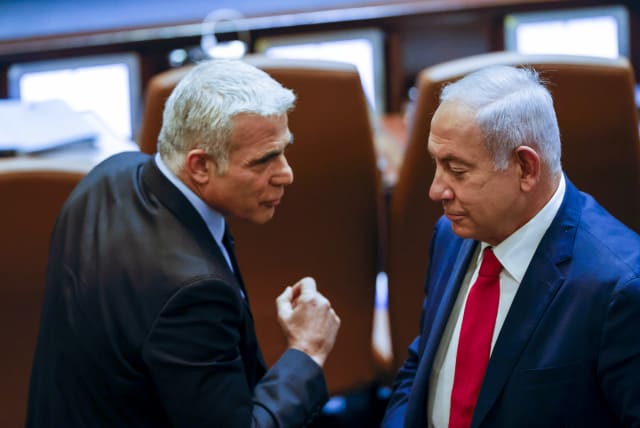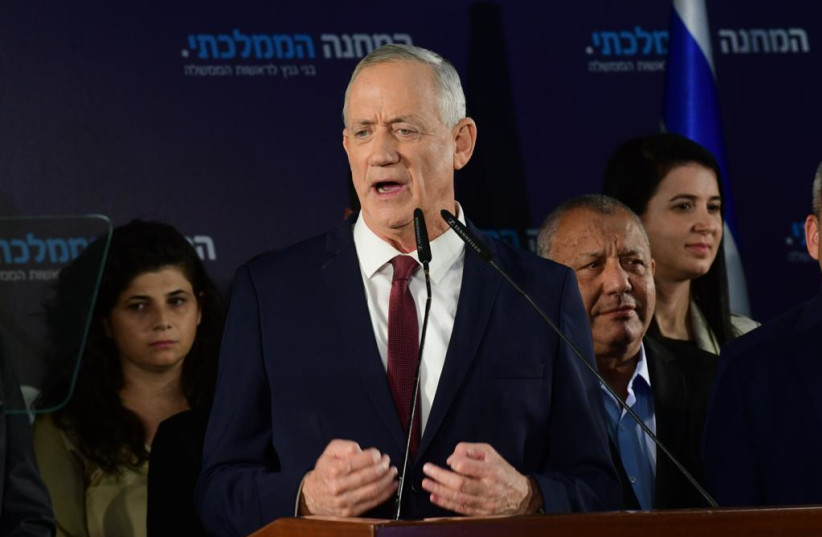With Netanyahu, Ben-Gvir, Israel exits Lapid's intolerant gov't - opinion

The outgoing government painted Benjamin Netanyahu and his supporters as insidious and dangerous, and that was just the beginning.
Israel’s recently completed election, its fifth in four years, offers insight into the attitudes of the Israeli public and the political struggle.
The outgoing government was established and unified under the “Anyone but Bibi” moniker, and was built around the lowest common denominator of only tackling areas of broad consensus.
However, once they came to power, the government quickly expanded into divisive policy positions ranging from religion/state, nationalism, family values, personal security and more. Policy statements seamlessly converged into action, causing backlash from those who thought they were receiving a “unity government,” but quickly found out how wrong they were.
Israel's outgoing government was intolerant
The outgoing government, the one that boasted being democratic, liberal and tolerant, painted Benjamin Netanyahu and his supporters as insidious and dangerous, and that was just the beginning.
The awful streams of venomous expressions against Netanyahu, included such stalwarts as Meretz MK Yair Golan’s “We need to save Israel from the malignant disease that is Netanyahu” or Yesh Atid’s MK Ram Ben Barak’s scholarly explanation that “Hitler was also elected democratically.”
While many ignored those comments as merely pot shots by partisan, activity politicians, even Defense Minister Benny Gantz incredulously stated, “If there is a Netanyahu-61 government, call me for an exit interview for the state.”
Really? Netanyahu had already become the longest-serving prime minister in Israel’s history, but somehow if the voters would give him another opportunity, that would be enough for our defense minister to abandon the state?
And the target of these rants quickly transitioned from the Likud leader to “Likud voters are a river of filth,” which outgoing Prime Minister Yair Lapid shared in a TV interview, explaining to more than a million Likud (the most popular single party) voters what he thought of them.
After a statement like that, it’s hard to be everyone’s prime minister. And in the last campaign, Yesh Atid made sure to brand the Likud as “a Sephardi party,” as if being Sephardi is a derogatory word in the Israel of 2022.
That may help election analysts understand why Shas, a political party of strongly identified Sephardi Jews, increased its vote totals by almost 20% from last election.
And then there is Avigdor Liberman, chairman of Yisrael Beytenu who proudly declared, “The ultra-Orthodox together with Bibi – in one wheelbarrow, to a good landfill.” Is there any wonder how disaffected and disgusted a significant amount of the public would feel toward its own finance minister?
By linking the ultra-Orthodox with Netanyahu, Liberman demonstrated that he not only hates his political nemesis Netanyahu, but he expresses a disgusting hate towards a large and growing segment of the population, the “ultra-Orthodox.”
In an interview with the Magzari website, attorney Batia Kahane Dror, a Yisrael Beytenu Knesset candidate, declared the “ultra-Orthodox are a burden.” The government included a party that consistently used tropes, stereotypes and outright attacks against a minority community in Israel and was not taken to task for it. With those types of attitudes, it is not surprising that Netanyahu would eventually be compared to Goebbels and Stalin.
BUT THOSE words were not empty, as they were backed by divisive policies. Health Minister and now former chairman of Meretz Nitzan Horowitz achieved three things, none of which dealt with Netanyahu or the improvement of health of the general population.
His three main accomplishments included the cancellation of a questionnaire that members of the LGBT community would fill out prior to donating blood; the banning of “conversion treatments”; and the mandated inclusion of coverage for gender reassignment by health funds at the expense of life-saving drugs.
As a mayor, father and as a fair, open-minded person with empathetic attitudes toward the LGBT community, I cannot condone making such policy changes defiantly and forcibly, with coercion, as Minister Horowitz did.
He later handled another sensitive issue with similar “tact” by demanding that hospital directors permit the entry of hametz into hospitals over Passover. The policy and the way he handled it was the actual straw that broke the government’s back.
His policies, along with those of Labor leader Merav Michaeli, quite clearly caused many to feel that the traditional family unit – containing a father and mother – should not be considered the norm, and was under attack.
Of course, we must make precautions, to prevent discrimination and harm to any community, but Horowitz was the health minister for the whole country, not only the LGBT community. He ignored the pressing (non-controversial) needs of the public that demanded more MRI machines, and expanding the treatments and medications to be covered by insurance. All of a sudden, anyone who disagreed with the minister’s worldview became a dark and threatening enemy. Defenders of the family unit had been shaken.
Not to be outdone, the transportation minister couldn’t just build out infrastructure without attempting to harm Shabbat observance or the cancellation of major infrastructure projects in Judea & Samaria.
Remember, this government relied heavily on settlers and pro-settler supporters, and even received the active endorsement of the chairman of the YESHA Council, but the government refused to not miss an opportunity to poke their own coalition members.
Despite the active support of the YESHA chairman, a de-facto building freeze was enforced, ignoring the wishes of their voters to avoid contentious issues. Based on their actions, settlers who did not vote for Bibi felt that they were not welcome in the government.
The “change” government was established to avoid divisive issues that would require broad dialogue, debate and compromise to enact. Yet issues like public transportation on Shabbat and Passover observance in hospitals, and other issues like the ultra-Orthodox combining Torah study and secular studies, and building freezes in Judea & Samaria, demonstrate that the policy priorities of the outgoing government were anything but embracing.
Settlements and the cancellation of infrastructure that were designed to benefit both Israelis and Palestinians – have nothing to do with Bibi and yet they were targets of the Lapid government. Far from being represented by this government, too many Israelis felt ostracized and marginalized.
So naturally, the inevitable happened on Election Day. The public was able to remove the yoke of the “change government.”
From the outside, the outgoing government was hailed as the best Israel has to offer, a broad coalition government that includes leaders from diverse backgrounds willing to sacrifice ideology for the good of the nation.
Unfortunately to many of the citizens that were subject to its policies, even those who voted for the government, it often felt condescending, vindictive and divisive.
As Israel heads toward a new government – one that many outside of Israel fear will be intolerant, hateful, fascistic – we can only hope that the new government will learn to hate less and listen more, respecting different opinions and governing the entire country.
The writer is mayor of Efrat and the former chief foreign envoy for the Israeli communities in Judea & Samaria.
Jerusalem Post Store
`; document.getElementById("linkPremium").innerHTML = cont; var divWithLink = document.getElementById("premium-link"); if (divWithLink !== null && divWithLink !== 'undefined') { divWithLink.style.border = "solid 1px #cb0f3e"; divWithLink.style.textAlign = "center"; divWithLink.style.marginBottom = "15px"; divWithLink.style.marginTop = "15px"; divWithLink.style.width = "100%"; divWithLink.style.backgroundColor = "#122952"; divWithLink.style.color = "#ffffff"; divWithLink.style.lineHeight = "1.5"; } } (function (v, i) { });

